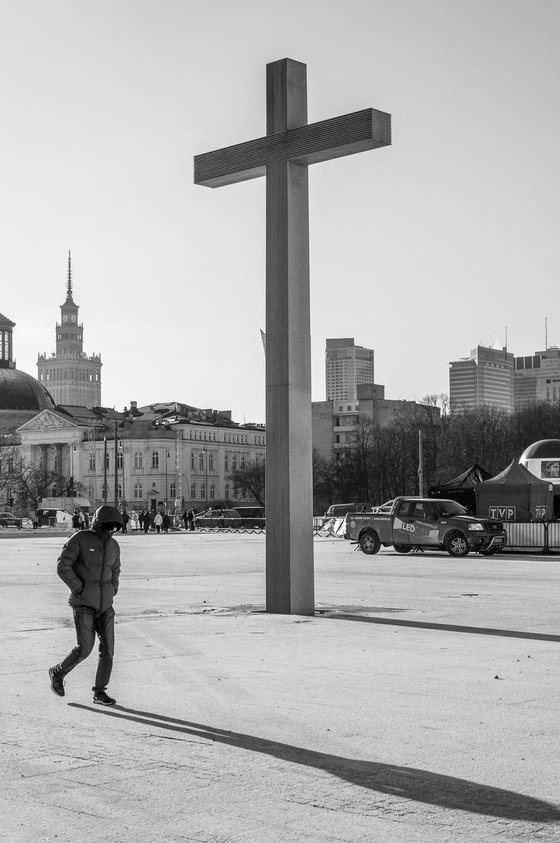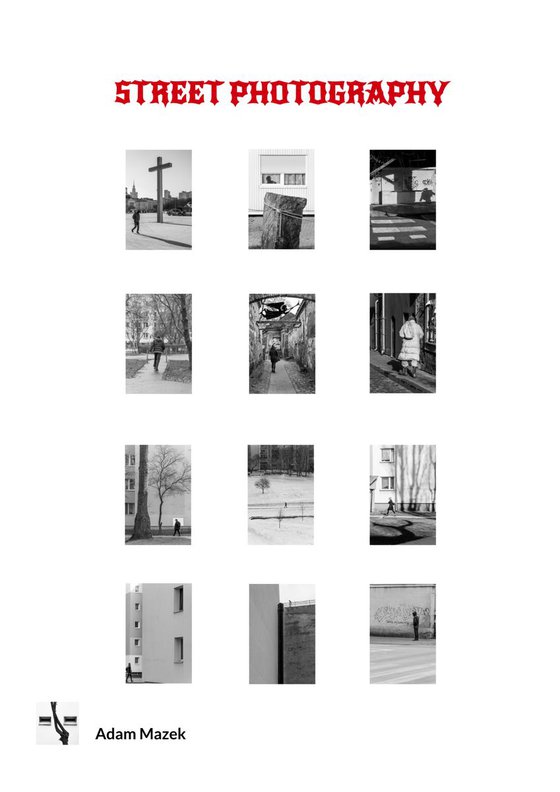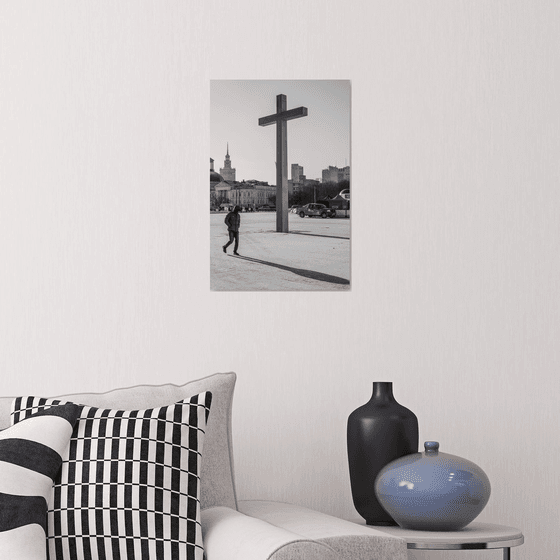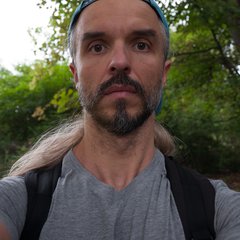- By medium
- By subject
- By budget
- Sales
- Gift cards
- Discover all art
- Artists
- Editors’ picks
- Ideas
Artwork description:
A photographic work entitled “Street Photography” is a tribute to the pioneers of this art genre. They are French photographers: Eugène Atget and Henri Cartier-Bresson.
The leitmotif of classic street photography is usually city dwellers. However, we rarely see people in my photos. In contrast to the classics of the genre, I avoid presenting human figures in my photographs. Nevertheless, the work “Street Photography” is an exception. Twelve pictures which composed the artwork refer to the classic French street photography school.
Firstly, Eugène Atget has made around ten thousand photographs in his life. Moreover, he did it at the turn of the 19th and 20th centuries. Bearing in mind that it happened in the time of analog photography, his effort should be considered titanic. With his work, he eternalized Paris and its inhabitants, for all the posterity.
On the other hand, for Henri Cartier-Bresson, the essence of street photography was to capture the decisive moment.
Many of his photographs, with people in the leading role, became part of the genre’s canon. Therefore, the photos of the French photographer have become a never-ending inspiration for the next generations of street photographers.
In his work, Adam Mazek made pictures mainly on the streets of Warsaw. Also, Vilnius and Gdansk are presented in this work. Images were taken between 2016-2018. We see people walking, standing, and even staggering individual. In part of the photographs shown in work “Street Photography,” people are just a supplement to the frame.
Nevertheless, it is this “human element” that plays a crucial compositional role. With the silhouettes of people, the images form a complete and balancing whole. In the photographs of Adam Mazek, people are presented near concrete, minimalist and rough walls. Moreover, human silhouettes can also be found between trees, or only shadows and human contours are visible amidst an inaccessible urban landscape. Also, vertical frames make people isolated and alone in a specific, often ominous, urban landscape.
Looking at the pictures, the viewer might ask himself if he also does not feel at all in the urban jungle, just like the heroes from photography?
Furthermore, is loneliness an integral element of life in big cities? Also, are we afraid of something or someone while walking in our neighborhood? Or, maybe the fact that someone continuously monitors and observes us makes us feel safe? Or perhaps it is a threat and a cause for concern for us? Speaking shortly: Adam Mazek’s photographs do not bring any answers. While analyzing them, only questions and doubts appear.
*Please, take a notice that the graphic is not for sale. For sale is only photograph "Quo Vadis."
Materials used:
Photography is on the foam board.
Tags:
#shadow #melancholy #black and #silhouette #minimalism #atget #faith #art photography #religion #human #vertical #cross #street photography #cartier-bresson #quo vadisQuo Vadis (from the "Street Photography" set) (2018) Photograph
by Adam Mazek
2 Artist Reviews
Now £75.57 £151.13
50% off sale. Sale ends in 10 days 13 hours
- Photograph on Paper on board
- From a limited edition of 1
- Size: 30 x 45 x 0.5cm (unframed) / 30 x 45cm (actual image size)
- Ready to hang
- Signed and numbered on the back
- Style: Photorealistic
- Subject: People and portraits
- Hurry only 1 left in stock
Loading
Artwork description
A photographic work entitled “Street Photography” is a tribute to the pioneers of this art genre. They are French photographers: Eugène Atget and Henri Cartier-Bresson.
The leitmotif of classic street photography is usually city dwellers. However, we rarely see people in my photos. In contrast to the classics of the genre, I avoid presenting human figures in my photographs. Nevertheless, the work “Street Photography” is an exception. Twelve pictures which composed the artwork refer to the classic French street photography school.
Firstly, Eugène Atget has made around ten thousand photographs in his life. Moreover, he did it at the turn of the 19th and 20th centuries. Bearing in mind that it happened in the time of analog photography, his effort should be considered titanic. With his work, he eternalized Paris and its inhabitants, for all the posterity.
On the other hand, for Henri Cartier-Bresson, the essence of street photography was to capture the decisive moment.
Many of his photographs, with people in the leading role, became part of the genre’s canon. Therefore, the photos of the French photographer have become a never-ending inspiration for the next generations of street photographers.
In his work, Adam Mazek made pictures mainly on the streets of Warsaw. Also, Vilnius and Gdansk are presented in this work. Images were taken between 2016-2018. We see people walking, standing, and even staggering individual. In part of the photographs shown in work “Street Photography,” people are just a supplement to the frame.
Nevertheless, it is this “human element” that plays a crucial compositional role. With the silhouettes of people, the images form a complete and balancing whole. In the photographs of Adam Mazek, people are presented near concrete, minimalist and rough walls. Moreover, human silhouettes can also be found between trees, or only shadows and human contours are visible amidst an inaccessible urban landscape. Also, vertical frames make people isolated and alone in a specific, often ominous, urban landscape.
Looking at the pictures, the viewer might ask himself if he also does not feel at all in the urban jungle, just like the heroes from photography?
Furthermore, is loneliness an integral element of life in big cities? Also, are we afraid of something or someone while walking in our neighborhood? Or, maybe the fact that someone continuously monitors and observes us makes us feel safe? Or perhaps it is a threat and a cause for concern for us? Speaking shortly: Adam Mazek’s photographs do not bring any answers. While analyzing them, only questions and doubts appear.
*Please, take a notice that the graphic is not for sale. For sale is only photograph "Quo Vadis."
Materials used:
Photography is on the foam board.
Tags:
#shadow #melancholy #black and #silhouette #minimalism #atget #faith #art photography #religion #human #vertical #cross #street photography #cartier-bresson #quo vadis14 day money back guaranteeLearn more



